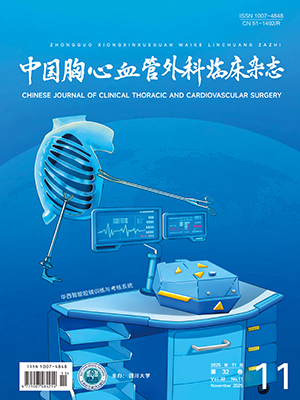| 1. |
Buckingham TA, Hatala R. Anticoagulants for atrial fibrillation: Why is the treatment rate so low? Clin Cardiol, 2002, 25(10): 447-454.
|
| 2. |
Hirsh J, Fuster V, Ansell J, et al. American Heart Association/American College of Cardiology Foundation guide to warfarin therapy. Circulation, 2003, 107(12): 1692-1711.
|
| 3. |
中华医学会心血管病学分会中国老年学学会心脑血管病专业委员会. 华法林抗凝治疗的中国专家共识. 中华内科杂志, 2013, 52(1): 76-82.
|
| 4. |
Li Y, Dong L, Xiang D, et al. Patient compliance with an anticoagulation management system based on a smartphone application. J Thromb Thrombolysis, 2019, 48(2): 263-269.
|
| 5. |
张永春, 李业涛, 谢贵华, 等. 抗凝自我管理手机APP软件的研制与应用. 护理研究, 2020, 34(10): 1844-1845.
|
| 6. |
中华医学会, 主编. 临床技术操作规范心血管外科学分册. 北京: 人民军医出版社, 2009. 141-153.
|
| 7. |
Peduzzi P, Concato J, Kemper E, et al. A simulation study of the number of events per variable in logistic regression analysis. J Clin Epidemiol, 1996, 49(12): 1373-1379.
|
| 8. |
姜姝丹, 何秋毅, 刘晓曼, 等. 远程管理在华法林抗凝治疗中的应用概况. 中国医院药学杂志, 2020, 40(14): 1582-1586.
|
| 9. |
Holbrook A, Schulman S, Witt DM, et al. Evidence-based management of anticoagulant therapy: Antithrombotic therapy and prevention of thrombosis, 9th ed: American College of Chest Physicians Evidence-Based Clinical Practice Guidelines. Chest, 2012, 141(2 Suppl): e152S-e184S.
|
| 10. |
梁诗琪, 刘雨薇, 贺育华, 等.患者智能监测及风险预警的研究进展.中国普外基础与临床杂志, 2021. [Epub ahead of print].
|
| 11. |
Nishimura RA, Otto CM, Bonow RO, et al. 2014 AHA/ACC Guideline for the Management of Patients With Valvular Heart Disease: executive summary: a report of the American College of Cardiology/American Heart Association Task Force on Practice Guidelines. Circulation, 2014, 129(23): 2440-2492.
|
| 12. |
石应康, 董力, 付博. 中国人心脏瓣膜置换术后低强度抗凝治疗3000例随访1年报告. 四川大学学报(医学版), 2016, 47(1): 90-92.
|
| 13. |
董力, 石应康, 付博, 等. 中国人心脏瓣膜置换术后低强度抗凝治疗的系统评价及文献分析. 中华医学杂志, 2014, 94(34): 2673-2676.
|
| 14. |
马俊珩, 葛卫红, 于锋. 心脏瓣膜置换术后华法林低强度抗凝的疗效观察. 吉林医学, 2012, 33(31): 6759-6760.
|
| 15. |
董力, 石应康, 许建屏, 等. 中国心脏瓣膜术后多中心低强度抗凝治疗注册登记及随访研究. 中华医学杂志, 2016, 96(19): 1489-1494.
|




